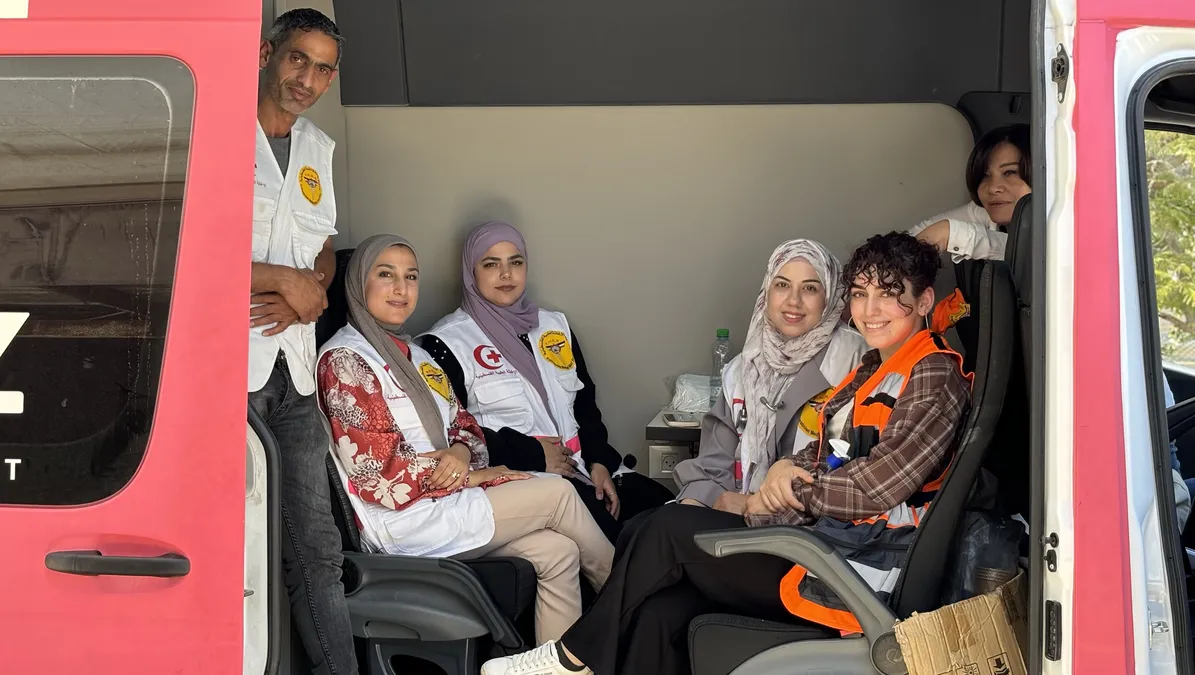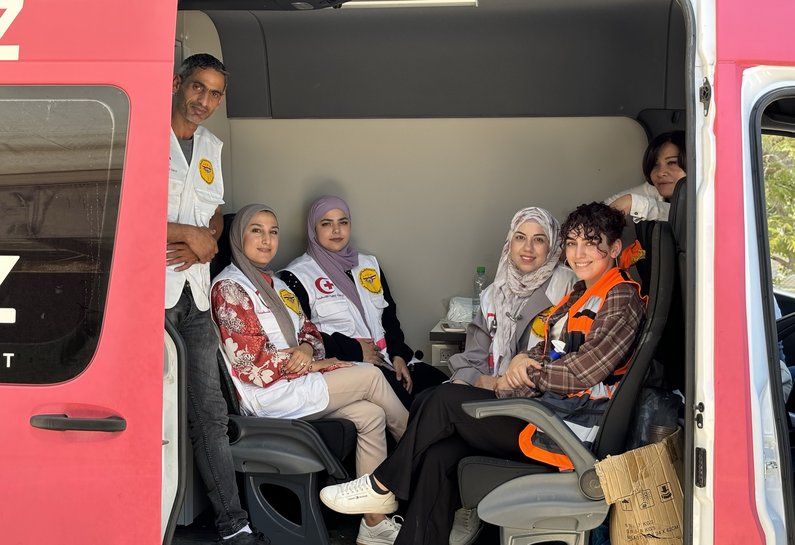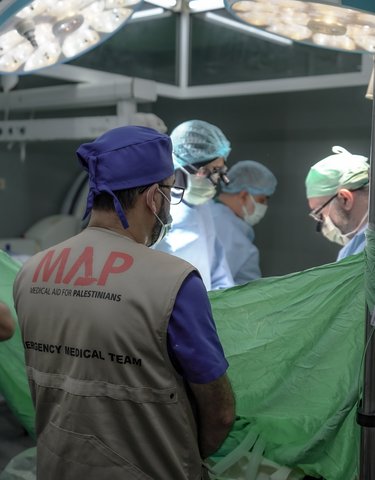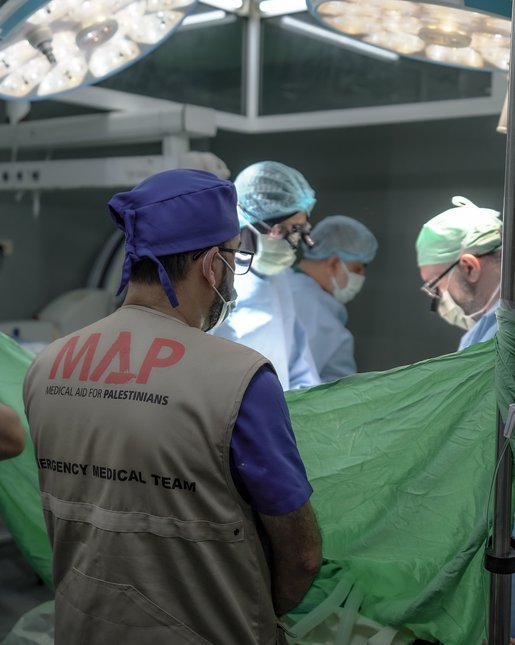How MAP is supporting mental health care for Palestinians under attack
10 October 2024

The last year has been one of the most painful in Palestinian history. As Israel’s illegal occupation,policies of racial segregation and apartheid, and military violence tear apart lives throughout the occupied Palestinian territory and refugee camps in Lebanon, Palestinians face unprecedented threats to their health and dignity, and are exposed to untold traumas. The mental health impact of this is incalculable.

To mark World Mental Health Day on 10 October, Medical Aid for Palestinians (MAP)’s staff shared how they are providing much needed mental health support to people impacted over the last year.
Gaza
Mohamed Abu Shawish, MAP’s Mental Health and Psychosocial Support Programme Lead
The past year in Gaza has been beyond comprehension. With more than 41,000 Palestinians killed and 96,000 injured so far, Israel’s war on Palestinians in Gaza here is the most violent in decades. All of Gaza’s 2.1 million inhabitants have either experienced or witnessed traumatic events, including attacks, airstrikes, house demolitions, constant displacement, the death of family and friends, and the impact of injuries. No one has lived through this untouched by pain and anguish.
As a result, mental health needs in Gaza are now huge, with children particularly vulnerable. Since Israel’s military attacks began, the most common mental health issues observed include post-traumatic stress disorder (PTSD), depression, anxiety and sleep disturbances. In just one recent survey of people living in collective shelters, more than 96% of respondents reported that they suffer from continuous crying and panic attacks.
To address this huge need and support people facing trauma and loss, MAP is working with the Ministry of Health to improve access to emergency mental health and psychosocial support for Palestinians in central Gaza.
At the medical points established by MAP, we are providing community-based psychosocial and clinical support to people in need. We are also focusing on peer support models, and training communities to support each other in dealing with stress and trauma.
To complement these, we are running psychological first aid training programmes for our staff and volunteers. This will equip them with the skills to provide immediate psychological support to people affected by traumatic events. We also are building mental health support into all our projects, including those tackling malnutrition and gender-based violence, and supporting people with disabilities.
We are also providing resources such as medicines for people with long term mental health conditions and recreational kits to therapists to support their practice.
West Bank
Enas Tina, MAP’s Programme Officer and Mental Health Focal Point
Palestinians living under Israel’s military occupation in the West Bank are subject to stress in every aspect of their lives. Lack of access to health services, settler violence, threats of home demolition, poverty, and trauma caused by violence and displacement are ever-present realities.
At MAP, we provide a range of mental health and psychosocial support work to communities. This includes providing psychological first aid with our partner, the Palestinian Medical Relief Society (PMRS), in ‘Area C’ communities in the Jordan Valley and South Hebron through mobile clinics – where permanent healthcare facilities are denied by Israeli authorities; funding a psychiatric resident at Bethlehem Mental Health Hospital; and training mental health staff at our partner organisations, the UN Relief and Works Agency for Palestinian refugees (UNWRA) and the Palestinian Medical Relief Society (PMRS).
We provide medicines and other support to the Palestinian Ministry of Health, and raise awareness about mental health issues across the occupied Palestinian territory through supporting the production of a podcast called ‘Mish Therapy’.
Following increased Israeli military assaults on Tulkarem refugee camp since 2022, people living there are facing huge challenges, from destroyed buildings and infrastructure, to the loss of community members and anxiety about further violence. MAP works with Al Awda Centre to provide mental health and other services to over 100 children from Tulkarem and Nur Shams refugee camps. We have also supported a team of four nurses to conduct home visits to around 200 elderly and sick people in the camps.
Lebanon
Wafa Dakwar, MAP’s Lebanon Director
As Israel’s military attacks on Lebanon escalate, with hundreds of thousands of people displaced from their homes in the past two weeks, including an increasing number of Palestinian refugees, MAP is deeply concerned by the severe humanitarian impact on communities that we serve.
Alongside our local partners, we are providing mental health and psychosocial support for displaced families seeking refuge in shelters set up by UNRWA, including in southern and northern Lebanon. Our teams are providing services such as reception and orientation of the displaced, conducting psychosocial support group activities to children and caregivers, and providing psychological first aid and counselling.
With your help, MAP can continue to provide vital mental health care to Palestinians in Gaza, the West Bank and Lebanon.
Photo: The Palestinian Medical Relief Society mobile clinic team that MAP supports to provide healthcare to communities in ‘Area C’ of the West Bank.

